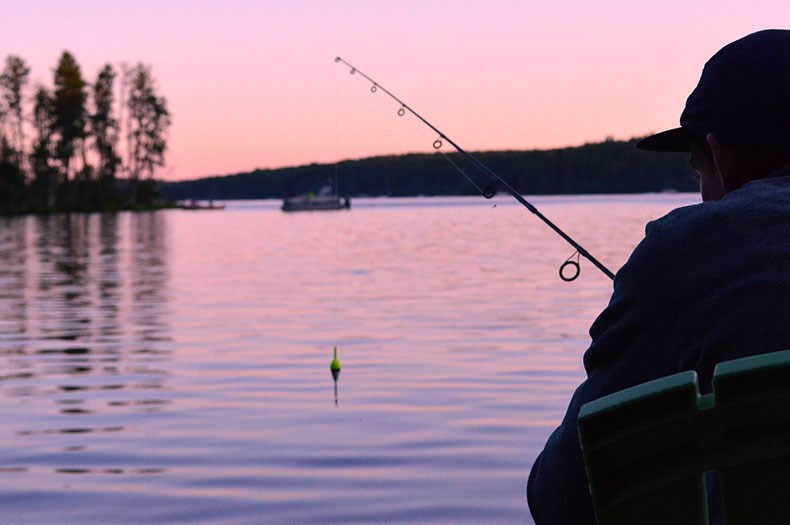FORT FRANCES — The issue of anglers abusing the 1908 Boundary Water Agreement between the United States and Canada is starting to gain attention as members of Parliament in the Thunder Bay-Rainy River and Kenora district are stepping up to ensure Canada’s border policies are being enforced.
In an interview with Thunder Bay-Rainy River MP Marcus Powlowski during a press conference in Thunder Bay, he was asked what progress was being made about American anglers fishing in Canadian waters.
Powlowski told Dougall Media that this issue needs political advocacy because enforcing border rules affects a larger portion of Canadian quality of life.
“There are a lot of people who are very dependent on tourism and anglers from the United States. They've experienced a decrease in the number of people coming to fish in the fish camps on the Canadian side because Americans are coming across the border.
"There are parameters that they're supposed to be operating within,” Powlowski said.
American outfitters need Canadian work permits to be fishing guides in Canadian waters.
The problem is these outfitters are boating over, dropping anchor on the Canadian side, getting their catch of the day, and returning to America without checking into the border office.
“If you come across and you don't stop in at the border, you're supposed to not land your boat ashore. You're not allowed to put down anchor or connect with another boat.
"You certainly can't go ashore to buy bait. It seems a lot of those rules, at least according to people in the region, are not being adhered to,” explained Powlowski.
According to an open letter Powlowski wrote to the federal and provincial governments in July, “the Boundary Water's Agreement basically ensures that Canadians and Americans shall equally share the economic benefit of these shared waterways.”
However, he points out that the 1908 agreement is seriously outdated.
He wrote, “Back in 1908, the populations of both countries were, however, much smaller, and without GPS systems and other modern technologies, many fewer American anglers were willing to venture far into the labyrinth of islands and inlets in the northern parts of either Lake of the Woods or Rainy Lake.”
“In addition, boats had smaller engines, so transportation was slower. Because of these factors many Americans in the past chose to stay in Canadian fishing camps. As a result, Canada has historically economically benefited from the many good Americans who come up here to stay in our fishing lodges.”
Today, technology has advanced significantly since 1908. Anglers operate with larger boat engines and are equipped with GPS.
Moreover, Powlowski admits there is a seeming disinterest for Americans to camp on the side; therefore, they circumvent the existing laws. As a result, Canada is seeing its resources being taken back to America with little economic exchange.
Powlowski said the reason this issue is becoming an increasing problem in the region is due to the lack of uniformed officers policing the waterways.
“We have a limited number of people. For example, there's only three RCMP officers that cover all the way from, I think, White River to the Manitoba border. They're the ones that are involved, not only in some of the enforcement of border rules, but also in dealing with things like human trafficking and drug trafficking. There used to be 20-something people. Now there's three,” Powlowski said.
Eric Melillo, member of Parliament for Kenora, said this issue is of great concern to him as his Lake of the Wood riding has also been effected.
He has been working closely with Powlowski to find solutions.
“We understand the concern with it. We want to make sure that we can have a policy that works for everyone and it's fair for everyone, especially our Canadian outfitters,” said Melillo.
He also said he has engaged in constant discussions with members of Congress in Minnesota.
Nevertheless, the leader of the Conservative Party, Pierre Poilievre, has a different approach.
When interviewed regarding his campaign promises, Poilievere was asked if he was aware of the border protection concerns in the region.
"We would definitely impose strong penalties on the poachers and that we work with our American friends to crack down on anyone who's doing poaching. We need to protect our natural heritage and the species that are legitimately hunted.”
Poilievre said he would improve security but investing in upgraded equipment and sensors to protect Canadian borders.
Powlowski said he is coordinating a meeting in Fort Frances with the Canadian Border Security Agency and RCMP on how to move forward with this issue.
“That's a matter of politics because across the country there's a lot of different issues, obviously that the federal government has to be paying attention to. And so, there's a competition for existing resources. We need more resources to enforce the existing rules regarding the border because the people that are suffering as a result of this are the fishing camps and people in the tourism sector in Northwestern Ontario. I'm certainly pushing hard on this.”
